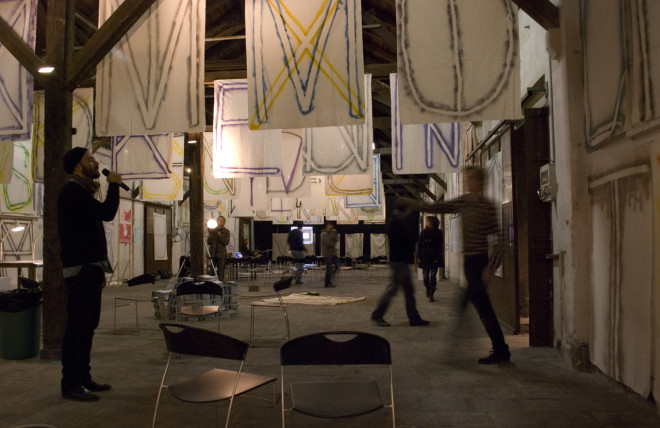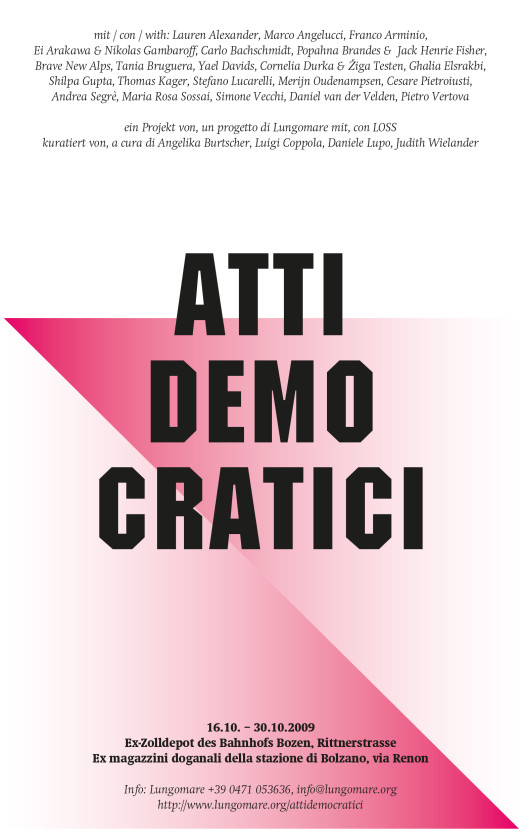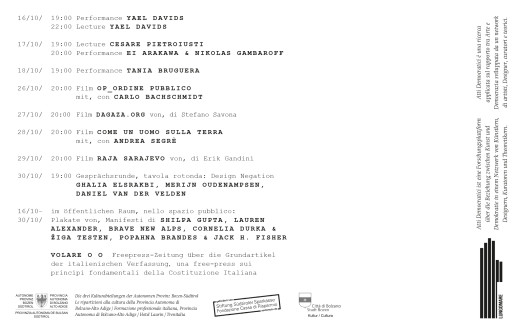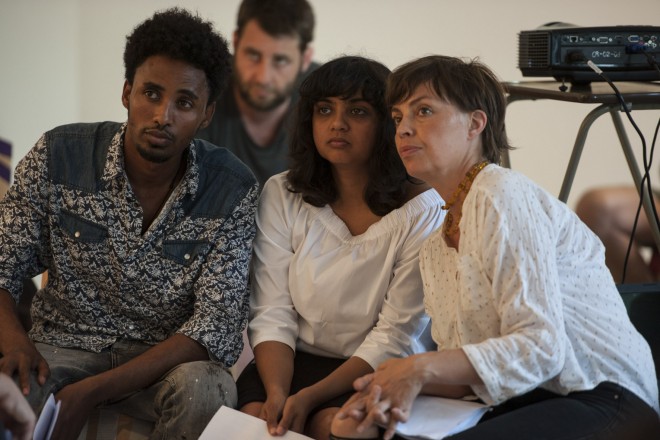Atti democratici
Atti Democratici is an inquiry into the relationship between art and democracy developed by a network of artists, designers, curators and theorists.
The project will unfold in a series of performances and films, a poster exhibition in urban space, a round table and a free-press journal on the basic principles of the Italian Constitution.
Democracy is a form of government that is defined as it goes; it is an imperfect and fallible system, founded on the individual and on the individual’s subjective action. Atti Democratici weds “acts” and “democracy”: acts understood as subjective actions open to discussion, and democracy viewed as a system of reference through which the action of its subjects is redefined and modified. A democratic act springs from a strong personal desire; it accepts risk, conflict, or dissent and it aims at the realization or explication of what is latent. A democracy must ensure the originality of each of its members – his or her capacity to speak out, to spark renewal and to reject passive acceptance of the status quo.
The project presents artistic experiments, inquiries and practices dealing with the relation between Art and Democracy, with the intent of facilitating the redefinition of the system in which they act and reclaiming the role and the responsibility of individuals as essential, active players in democracy. After stops at the Democracy Biennial in Turin and the Festival Fabbrica Europa in Florence, Lungomare and LOSS will present the third edition of Atti Democratici in Bolzano. The film series is curated by Vincenzo Marcuso.
Ex magazzini doganali of Bolzano / public space of Bolzano
- Lauren Alexander
- Marco Angelucci
- Ei Arakawa
- Franco Arminio
- Popahna Brandes
- Brave New Alps
- Tania Bruguera
- Yael Davids
- Corneila Durka
- Ghalia Elsrakbi
- Jack Henrie Fisher
- Nikolas Gambaroff
- Shilpa Gupta
- Thomas Kager
- Stefano Lucarelli
- Merijn Oudenampsen
- Cesare Pietroiusti
- Maria Rosa Sossai
- Zîga Testen
- Daniel Van der Velden
- Simone Vecchi
- Pietro Vertova
09/10/16 – Ex magazzini doganali, Bolzano
7 pm: A line, a word, a sentence – Performance by Yael Davids
10 pm: Learning to imitate – Lecture by Yael Davids
09/10/17 – Ex magazzini doganali, Bolzano
7 pm: Conversation with Cesare Pietroiusti
10 pm: FI VE SH IL LI NG SF OR AF UR CO AT – Performance by Ei Arakawa & Nikolas Gambaroff
09/10/18 – Ex magazzini doganali, Bolzano
7 pm: Autoconsumo – Performance by Tania Bruguera
09/10/26 – Ex magazzini doganali, Bolzano
8 pm: Film OP_Ordine pubblico
Conversation with Carlo Bachschmidt
09/10/27 – Ex magazzini doganali, Bolzano
8 pm: Film daGaza.org by Stefano Savona
09/10/28 – Ex magazzini doganali, Bolzano
8 pm: Film Come un uomo sulla terra
Conversation with the director Andrea Segrè
09/10/29 – Ex magazzini doganali, Bolzano
8 pm: Film Raja Sarajevo by Erik Gandini
09/10/30 – Ex magazzini doganali, Bolzano
7 pm: Roundtable: Design Negation
with Ghalia Elsrakbi, Merijn Oudenampsen, Daniel van der Velden
09/10/16 – 10/30 – in the public space of Bolzano:
Posters of the performance by Shilpa Gupta
Posters by Lauren Alexander, Brave New Alps, Cornelia Durka & Žiga Testen, Popahna Brandes & Jack Henrie Fisher
Volare O O, A free-press journal on the foundations of the Italian Constitution, with contributions of:
Marco Angelucci, Franco Arminio, Thomas Kager, Stefano Lucarelli, Cesare Pietroiusti, Maria Rosa Sossai, Simone Vecchi, Pietro Vertova
October 16
Opening with the curators Angelika Burtscher, Luigi Coppola, Daniele Lupo, Judith Wielander
– Presentation of Volare O O, a free-press journal on the foundations of the Italian Constitution
– Presentation of 70×100, a poster exhibition about Art and Democracy in the public spaces of Bolzano
– Presentation of the results of the Permanent workshop for the abolition of self-censorship in artistic creation with Cesare Pietroiusti
A series of performances about Art and Democracy
with Ei Arakawa & Nikolas Gambaroff, Tania Bruguera, Yael Davids, Shilpa Gupta
The performance series presents works that deal with relational dynamics and participatory processes. The invited artists come to grips with the Art-and-Democracy relationship in a very personal key. Their performances explore various socio-political issues, such as freedom of expression, active community participation, “giving voice” and calling in question roles, rules and predefined systems.
A line, a word, a sentence
16/10/09
Ex-Zolldepot Bozen / Ex magazzini doganali Bolzano
“A Line, a Word, a Sentence” is a performance that lends itself to multiple interpretations: on one hand, lips locked in cracks, which create strange “masks” or strange new anatomies on white panels; on the other hand performers intertwined in unnatural positions behind the “wall” constituted by the panels, unable to see beyond and, especially, to communicate with the viewer in a complete sense. It refers to the concept of resistance, to situations where it becomes impossible to express oneself naturally and one is forced to create a parallel language. Whereas the open mouths represent the energy of expression, the group positions itself in spatial con gurations that are laid out in a score.
Learning to imitate
16/10/09
Ex-Zolldepot Bozen / Ex magazzini doganali Bolzano
“Learning to Imitate” is a talk that aims to be performed. It tries to trace the attraction go the voice to silence. Yael Davids will look into expression as a way of shutting up; a search for words while constantly losing one’s breath; and voice as a foreign body resonating in the body’s silent spaces.
FI VE SH IL LI NG SF OR AF UR CO AT
17/10/09
Ex-Zolldepot Bozen / Ex magazzini doganali Bolzano
The artists alter the use of the alphabet using the monogram in speech and in written language. On the occasion of the performance in Bolzano they present 276 ags that contain all combinations of 276 alphabet monograms, collapsed letters with none privileged in the foreground or background. The performance is structured around an alteration of language using monograms as the main form of restructuring.
Autoconsumo
18/10/09
Ex-Zolldepot Bozen / Ex magazzini doganali Bolzano
A discussion on the proposal of Tania Bruguera with:
Tania Bruguera, artist
Susanne Barta, journalist
Franz Staffler, entrepreneur
Martina Schullian, entrepreneur
Waltraud Mittich, author
Christine Helfer, journalist
Maria Niederstätter, entrepreneur
Petra Seppi, business consultant
Hans Karl Pichler, entrepreneur
Giorgio Mezzalira, historian
Daniele Lupo, curator and designer
Judith Wielander, curator
Luigi Coppola, artist and curator
Angelika Burtscher, designer and curator
Lorenzo Viti, architect and translator
“Autoconsumo” takes into consideration the special condition of the South Tyrolean autonomy model, viewed today as an exemplary basis for overcoming several pressing social issues like the problem of minority groups, unemployment and immigration. On this aim, “Autoconsumo” will propose a new model for a public urban landscape. “Autoconsumo” consists on the presentation to the authorities of Bolzano a community project where all the businesses in the region commit to develop a new advertising strategy. The advertising to be posted across the city would not have any references to any product neither in text form nor in image, instead, each company will provide ethical messages.
Protocol of “Autoconsumo” (in Italian)
Don’t see Don’t hear Don’t speak
16/10 – 30/10/09
In the public space
Based on Mahatma Gandhi’s famous story of three monkeys, “See No Evil, Hear No Evil, Speak No Evil”, this photograph shows people covering each others’ senses. We see the reverse of this principle being followed today, where we find it convenient not to hear, see and speak. The photograph deals with the lack of hope and the convenient distance that we have created within ourselves and social change with emphasis on the individual.
October 26 – 29
Film screening and meeting with the filmmakers
Curated by Vincenzo Mancuso
Program
26/10: OP – Ordine pubblico
by the Genoa Legal Forum administrative office (Italy 2007, 44′)
Followed by a meeting with Carlo Bachschmidt, officer of Genova Legal Forums
27/10: daGaza.org
multimedia project produced by Pulsemedia and directed by Stefano Savona
28/10: Come un uomo sulla terra (Like a human on Earth) by Andrea Segrè, Dagmawi Yimer, Riccardo Biadene (Italy 2008, 60′)
Followed by a meeting with the director Andrea Segre
29/10: Raja Sarajevo by Erik Gandini (Sweden, 1995, 49’)
Become your media. This was the catchphrase launched by Indymedia, the new platform established in early 2000 on the web. Its birth coincided with the explosion of the new digital support, which was accompanied by a fall in the costs of video production and an increasingly swift spread of web-based broadcasting. Since then independent production, especially in the field of documentary filmmaking, has grown enormously, due precisely to the new digital support. This screening will present the most recent Italian documentaries. The projects have grown up far from the rules of the market. The freedom and simplicity of making a video (and the awareness of doing so) has become a stock element of everyday life. To become one’s own media is a reality today, and perhaps even a bit of a necessity.
October 16 – 30
A poster exhibition about Art and Democracy in the public spaces of Bolzano
The project investigates the tense relationship between Art and Democracy and proposes a geographic interpretation of the theme thanks to the designers’ different cultural and political backgrounds. The project uses the tools of visual communication and intends to reconcile the political and social relevance of graphic design.
With: Ei Arakawa & Nikolas Gambaroff, Tania Bruguera, Yael Davids, Shilpa Gupta
Freedom fighters are building malls
A critical image based on the changed role of the freedom fighter. From being a courageous and compassionate leader and fighter during Apartheid, to today’s post-Apartheid governmental representatives, who drive Mercedes Benz 4×4’s and live a life isolated from the people they once struggled for.
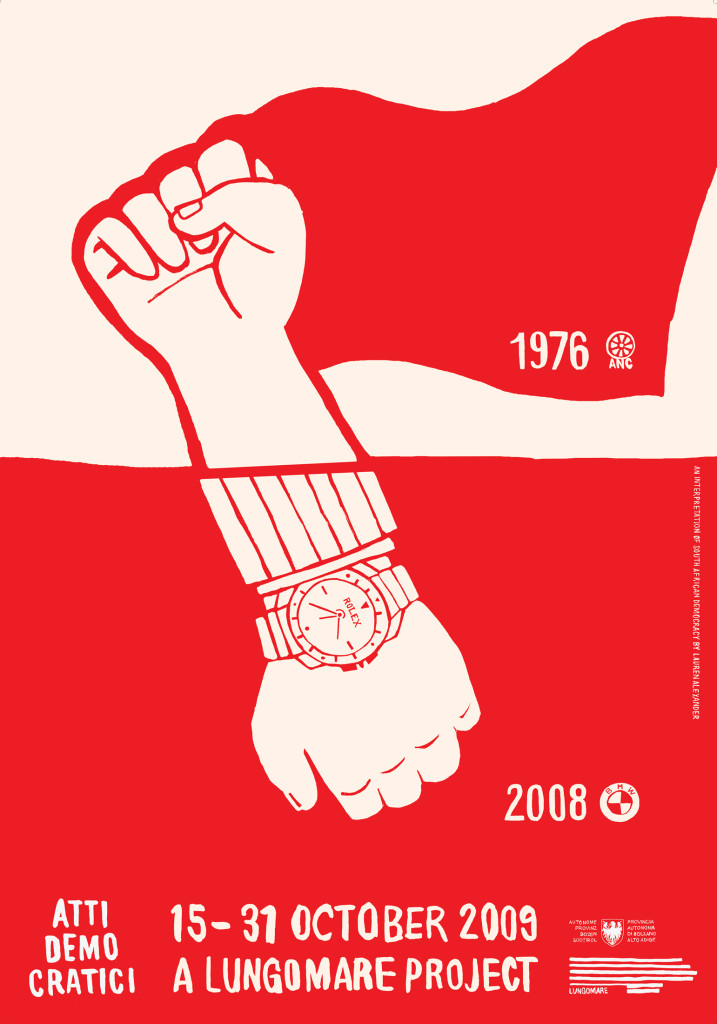
Freiraum
This democratic act consists in the creation of a neutral space in the city. As designers, Brave New Alps consciously resist the temptation to send more prepacked images and slogans into the public space – for the mental wellbeing of the citizens. The sum of all the posters “Freiraum” generates a liberated public space of about 700 m2 in the city of Bolzano.
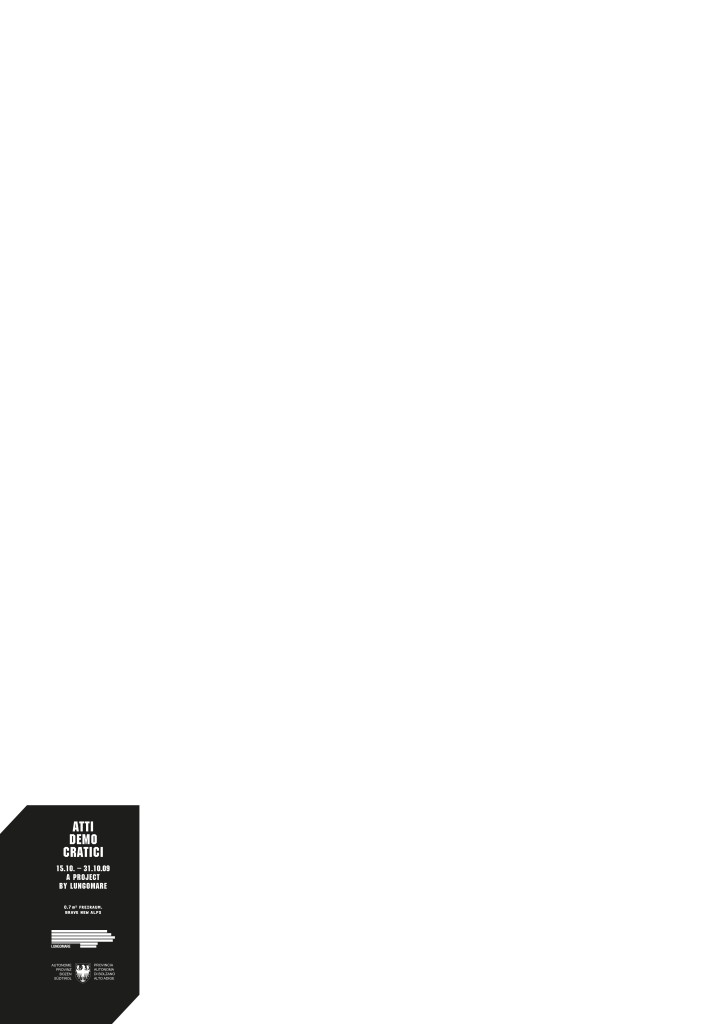
Text for Denaturalization
The „blue book examination“ suggests alternative ways to answer the questions posed on the highly formulaic U.S. citizenship test. The “poster writing” reads democracy as a fictional procedure of description, qualification, conversation and disagreement.
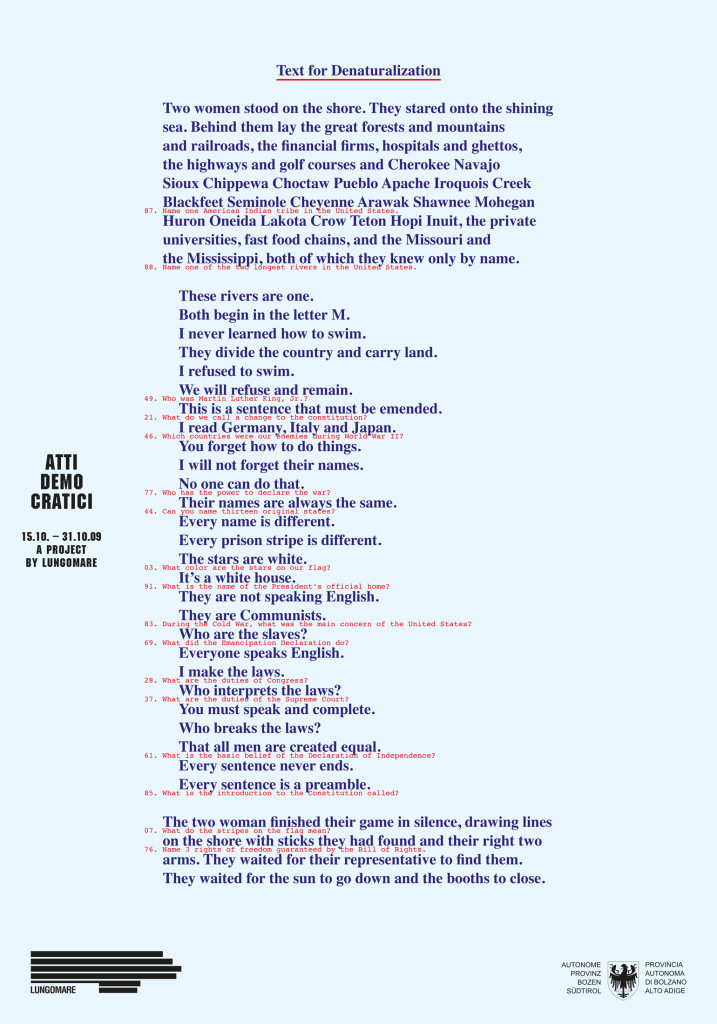
A wild selection of posters by designers and artists since 1945 engaging in “democratic acts”, taken from books and magazines about “the design of dissent” or “graphic agitation”. Ziga and Cornelia question the idea of “engagement as a designer” and therefore chose to limit the use of their poster to that of a futile collector’s item.
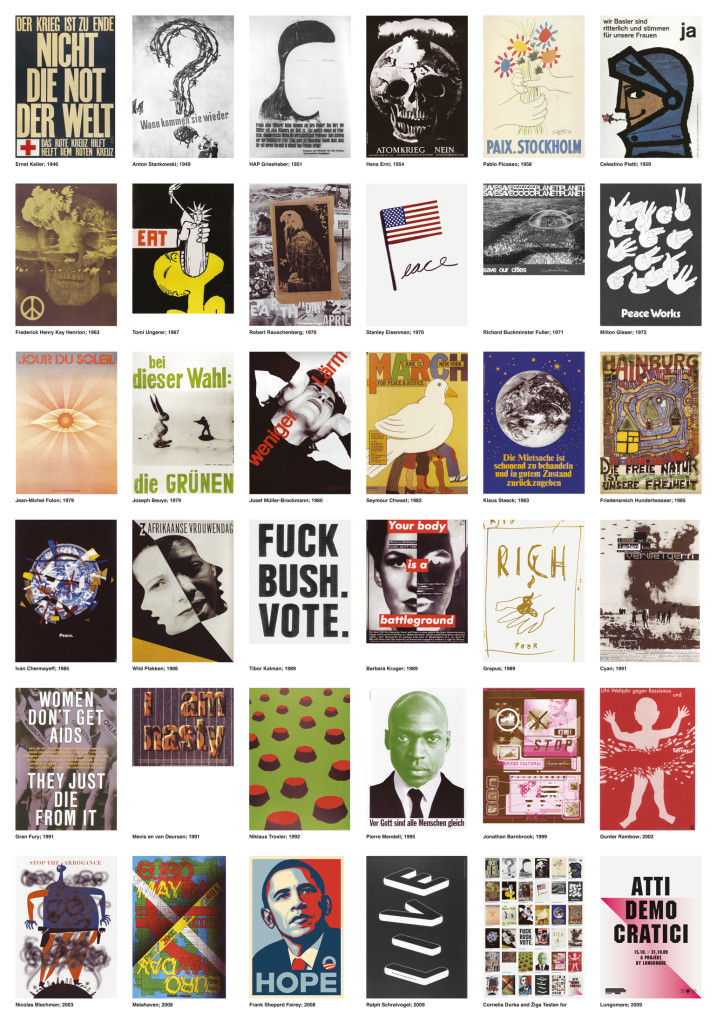
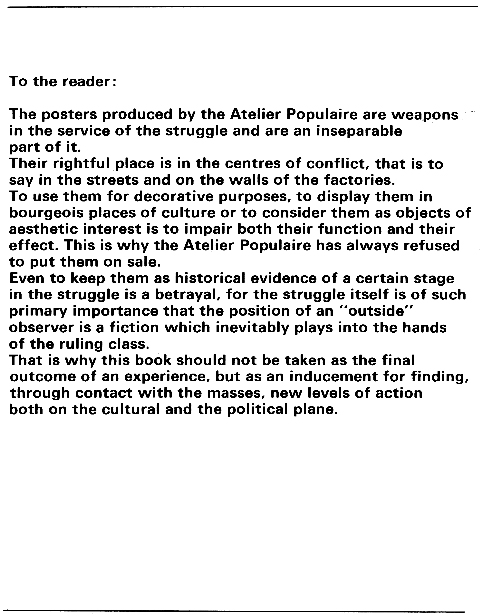
October 30
A roundtable
with Daniel van der Velden, Merijn Oudenampsen, Ghalia Elsrakbi
Design Negation is an inquiry into the populist imaginary of the Netherlands, conducted at the Jan van Eyck Academie in Maastricht (NL). The project aspires to extend the terrain of aesthetic investigation to which design practice generally restricts itself, regarding television and the internet as important sites for the construction of political imagery. The project takes aim at both the death of the political under the regime of technocratic consensus, and the deep entanglement of its undead revival – populism – with lifestyle and entertainment. The practice of Design in this case is not reduced simply to a formal and aesthetic practice; it seeks out its responsibilities in pursuit of a new political imaginary that speaks truth to power.
Interview with Daniel van der Velden
Performance for Electronics, Cello, Voice & Visuals
Live/Impro – performance/project in progress
Julia Kent (cello + pedals) – cellist, Antony and the Johnsons
Barbara de Dominicis (voice + live electronics)
Davide Lonardi (video installation)
Curated by Vanja Zappetti
October 16 – 30
A free-press on the foundations of the Italian Constitution
A project by Angelika Burtscher & Daniele Lupo, second edition in Bolzano
With: Marco Angelucci, Franco Arminio, Thomas Kager, Stefano Lucarelli, Cesare Pietroiusti, Maria Rosa Sossai, Simone Vecchi, Pietro Vertova
Volare O O analyzes the foundations of the Italian Constitution and compares them with the reality they endeavor to regulate. Volare O O comprises several issues of a free-press journal, which visualize a selection of the first twelve basic articles in the form of interviews, comments, discussions and images. The journal is intended for all citizens and is meant to investigate the prospects of, and challenges to, Italian democracy and its founding principles. It is a tool for making the Italian constitution more generally known and exploring its meanings and values in depth, in consideration of the important social, political and economic changes of our day.
The second edition will examine Article 4, 5, 6 and 9.
Article 4 – on the right to work, in relation to the protests of laborers of INSSE (Milan) and CNH (Imola). An interview with Stefano Lucarelli and Simone Vecchi conducted by Pietro Vertova.
Article 5 – on local self-government and particularly self-government in Alto Adige, will be discussed in a public debate that describes its limits, qualities and possible future developments, organized in collaboration with Thomas Kager and Marco Angelucci.
With: Abdel El Abchi, Thomas Benedikter, Stefano Fait, Matthias Fink, Gabriele di Luca, Laura Mautone, Waltraud Mittich, Vanja Zappetti
Audio recordings of the discussion about Article 5
Article 6 – on the protection of linguistic minorities, will be seen through the exploration of four villages of the Alto Adige by writer and “townologist” Franco Arminio.
Franco Arminio: Un paesologo in Alto Adige. Appunti sparsi (in Italian)
Article 9 – on the development of culture and of scientfic and technical research, will be dealt within a workshop on censure by the “Permanent Workshop for the Abolition of Self-Censure in Artistic Practice” coordinated and curated by Cesare Pietroiusti and Maria Rosa Sossai (see below).
October 7
Workshop
A project by Caesar Pietroiusti in collaboration with Maria Rosa Sossai
The LAP sees itself as a practical tool for reflection and direct action to analyse and combat the various forms of censorship and self-censorship that today decisively influence artistic research and the art world as a whole.
Even though acts of censorship have multiplied over time, with a parallel increase of often insidious self-censorship on the part of cultural and artistic institutions, Italy still does not have a genuine, in-depth debate concerning these themes. The choice not to exhibit works on burning issues, or to discourage artists from taking what are considered as uncomfortable positions, is the expression of a conception of culture at the service of arguments which are often of a political-strategic nature and that have nothing to do with the creative process, to the point, in some cases of taking the form of blackmail against the artists concerned. These acts of control favour the formation of a cultural conformity and the search for popular consensus that lead to self-limitation and the impoverishment of research. The workshop aims to explore how the phenomena of censorship, come to produce effects of self-censorship, and the narrowing of artistic potential.
Autonomous Province of Bozen/Bolzano-South Tyrol, Culture Departments
Fondazione Cassa di Risparmio
City of Bolzano, Culture Department
RFI Rete Ferrovia Italiana
What´s on
EXHIBITION :: Binta Diaw :: Collective Practices – A Living Experience of Feeling ListenedAbout Lungomare
Lungomare, a cultural association founded in Bolzano in 2003, was created from the desire and necessity to open a space in which to share differences, experiences, opinions and desires, a space in which to make the link between cultural production and the political and social dimension. Lungomare undertakes projects that investigate and test possible relationships between design, architecture, urban planning, art and theory, the results of which are presented in different formats: public discussions, conferences, publications, exhibitions and interventions in public spaces. All these formats are characterised by the intention to interact with cultural and socio-political processes relating to the region in which Lungomare is located.
Currently Lungomare’s activities focus on long-term residency projects, a format whereby Lungomare invites guests to engage and interact within the context of South Tyrol. Lungomare’s activities are based on three principles: specific attention to the context in which the association’s projects are undertaken, the transdisciplinary approach that distinguishes these projects, and reflection on the role of Lungomare as a cultural institution in connection with the region in which it operates.
Territory
Lungomare is located at the edge of Bolzano, the capital of South Tyrol, and relates to the context in which it operates, attempting to highlight the dynamics of change. Large urbanized areas alternate with broad areas of intensive cultivation and yet others of picturesque landscape, all of which penetrate the centre of the city. The city is surrounded by mountains and this is one of the reasons why the tourism industry has become a driving force in this locality. The demographic structure of the city has been characterized for a long time by the coexistence of two populations, those speaking German and those speaking Italian. However, the social and demographic composition of Alto Adige Südtirol is changing. Migrants, including those from non-European countries are making their way to the area to settle, whilst others, including political refugees, are flowing through the region.

